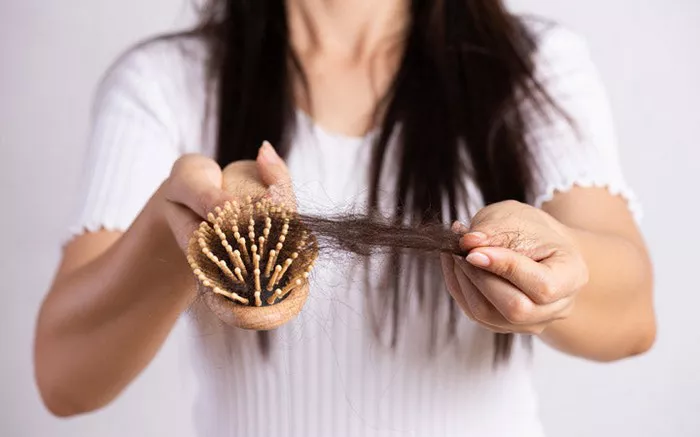Menopause is a natural phase of a woman’s life, marking the end of reproductive years. Alongside hormonal shifts, many women experience changes in their bodies, including hair loss. Understanding the causes, duration, and effective coping strategies can empower women to navigate this aspect of the menopausal journey. In this comprehensive guide, we’ll explore the connection between menopause and hair loss, shedding light on what to expect and how to manage it.
What are the symptoms of menopause?
Menopause is a natural phase in a woman’s life marked by the cessation of menstrual periods. Common symptoms include hot flashes, night sweats, mood swings, fatigue, sleep disturbances, vaginal dryness, decreased libido, and weight changes. Cognitive changes, such as memory problems and difficulty concentrating, can also occur. Menopause-related symptoms vary widely among individuals and can impact daily life. Hormonal fluctuations during this transition can lead to physical and emotional changes. While some symptoms are temporary, others may persist. Consulting a healthcare provider can help manage symptoms and ensure a smooth transition through this phase.
Why Does Hair Loss Occur During Menopause?
Hair loss during menopause is primarily attributed to hormonal changes, specifically the decline in estrogen and progesterone levels. These hormones play a crucial role in maintaining hair growth and thickness. As their levels decrease, hair follicles can become more sensitive to androgens (male hormones), which can lead to the thinning of hair strands. Additionally, reduced estrogen levels can affect the hair’s growth cycle, leading to shorter and finer hair.
Duration of Hair Loss During Menopause
Hair loss during menopause can vary among individuals. For many women, hair thinning becomes noticeable around the time of perimenopause, which is the transitional phase leading up to menopause. This thinning can continue into postmenopause. The duration of hair loss can range from a few months to several years. However, it’s important to note that not all women experience significant hair loss, and for some, the changes might be subtle.
Does menopause happen to more women?
Menopause is a natural and inevitable biological process that affects the majority of women. It typically occurs between the ages of 45 and 55, with an average age of around 51. As women age, their ovaries gradually produce fewer hormones, leading to the end of menstruation and fertility. While menopause is a universal experience, the intensity and duration of symptoms can vary greatly. Some women may go through menopause with minimal discomfort, while others might experience more pronounced symptoms that can impact their quality of life. Hormone replacement therapy and lifestyle adjustments can help manage symptoms for many women.
How to effectively deal with menopausal hair loss?
Managing menopausal hair loss requires a multi-faceted approach to promote hair health. Here are some strategies to consider:
1. Healthy Diet:
Consume a balanced diet rich in protein, vitamins (especially Biotin, Vitamin D, and Iron), and minerals to support hair growth.
2. Hydration:
Stay well-hydrated, as dehydration can affect hair health.
3. Gentle Hair Care:
Use mild shampoos and avoid excessive washing to prevent stress on weakened hair.
4. Manage Stress:
Practice stress-reduction techniques like yoga or meditation.
5. Consult a Healthcare Provider:
Discuss hormone replacement therapy or other medical options with a doctor.
Remember, menopausal hair loss can be temporary or long-term. Consulting a healthcare provider can help identify the underlying causes and develop a personalized plan to manage hair loss effectively.
See Also: What to Take for Hair Loss Due to Menopause: Expert Solutions
Conclusion
Hair loss during menopause is a common occurrence, and understanding its causes and management options can ease concerns. While the duration and severity of hair loss can vary, many women find that their hair health improves over time as their bodies adjust to new hormonal levels.
Remember that the menopausal journey is unique for each woman. Embracing self-care, maintaining a positive mindset, and seeking professional advice when needed can contribute to a smoother transition. Whether you choose to explore topical treatments or focus on overall well-being, remember that you have the tools to navigate hair changes and emerge from this phase with confidence and vitality.


